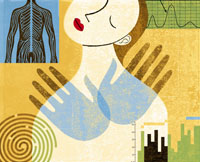Back to: News & Events : Past Meetings and Workshops : Conference on the Biology of Manual Therapies : Agenda

Natcher Conference Center
National Institutes of Health
June 9-10, 2005
A Hassle a Day May Keep The Doctor Away:
Enhancing Versus Suppressive Effects of Stress on Immune Function
Firdaus S. Dhabhar, Ph.D., Associate Professor, College of Dentistry & College of Medicine, The Ohio State University, Columbus, Ohio
It would be extremely beneficial if one could harness an individual's natural, endogenous, health-promoting survival mechanisms to fight disease and restore or maintain health. Interestingly, the psycho-physiological stress response is the most under-appreciated of nature's survival mechanisms. We initially hypothesized that just as an acute stress response prepares the cardiovascular and musculoskeletal systems for fight or flight, it may also prepare the immune system for challenges (e.g. wounding and antigen entry) that may be imposed by a stressor (e.g. predator or surgical procedure).1 We have defined stress as a constellation of events, comprised of a stimulus (stressor), that precipitates a reaction in the brain (stress perception), that activates physiologic fight/flight systems in the body (stress response).2 Chronic stress (lasting for weeks, months or years) is known to suppress or dysregulate immune responses. In contrast, acute stress (lasting for minutes to hours) has been shown to augment in vivo immune function.3
Our studies examine neuro-endocrine-immune interactions during primary and secondary immune responses using in vivo models of leukocyte trafficking and cell-mediated immunity (CMI).3-5 CMI responses are crucial for conferring immunoprotection during vaccination, or infection, but may also mediate immunopathology during inflammatory (e.g. cardiovascular disease, gingivitis, hypersensitivity) or autoimmune (e.g. psoriasis, arthritis, multiple sclerosis) diseases. Studies showed that acute stress experienced before either primary (innate immune response) or secondary (adaptive immune response) antigen exposure induces a large and long-lasting enhancement of CMI.3,5 This acute stress induced immunoehancement is mediated systemically by physiological levels of the stress hormones, corticosterone and epinephrine,6 and locally by gamma-interferon.7 Compared with controls, sites of immune activation from acutely stressed mice show significantly greater erythema and induration, numbers of infiltrating leukocytes, and levels of cytokine gene and protein expression.5 In contrast to acute stress and acute exposure to stress hormones, chronic stress is immunosuppressive and chronic exposure to corticosterone, or acute exposure to synthetic glucocorticoids like dexamethasone, significantly suppresses skin immunity.2,6 Our results suggest that during acute stress, endogenous stress hormones enhance skin immunity by increasing leukocyte trafficking and cytokine and chemokine gene expression at the site of wounding or antigen entry. Basic mechanistic experiments as well as clinical studies examining the immunological effects of acute versus chronic stress will be discussed. An attempt will be made to place these findings in the context of manual therapies and their effects on endocrine and immune function. (Supported by: NIH RO1 AI48995, AR 46299, CA107498, & The Dana Foundation Clinical Hypotheses Program in Brain-Body Interaction.)References:
- Dhabhar F.S., Miller A.H., McEwen B.S., and Spencer R.L. 1995. Effects of stress on immune cell distribution--dynamics and hormonal mechanisms. J. Immunology. 154:5511.
- Dhabhar F.S., and McEwen B.S. 1997. Acute stress enhances while chronic stress suppresses immune function in vivo: A potential role for leukocyte trafficking. Brain Behavior & Immunity. 11:286.
- Dhabhar F.S., and McEwen B.S. 1996. Stress-induced enhancement of antigen-specific cell-mediated immunity. J. Immunology. 156:2608.
- Viswanathan K., and Dhabhar F.S. 2005. Stress-induced enhancement of leukocyte trafficking into sites of surgery or immune activation. PNAS, USA. 102:5808.
- Dhabhar F.S., and Viswanathan K. 2005. Short-Term Stress Experienced At The Time Of Immunization Induces A Long-lasting Increase In Immunological Memory. AJP: Regulatory, Integrative, & Comparative Physiology. DOI, 10.1152/ajpregu.00145.2005:
- Dhabhar F.S., and McEwen B.S. 1999. Enhancing versus suppressive effects of stress hormones on skin immune function. PNAS, USA. 96:1059.
- Dhabhar F.S., Satoskar A.R., Bluethmann H., David J.R., and McEwen B.S. 2000. Stress-Induced Enhancement of Skin Immune Function: A Role For IFN . PNAS, USA. 97:2846.
